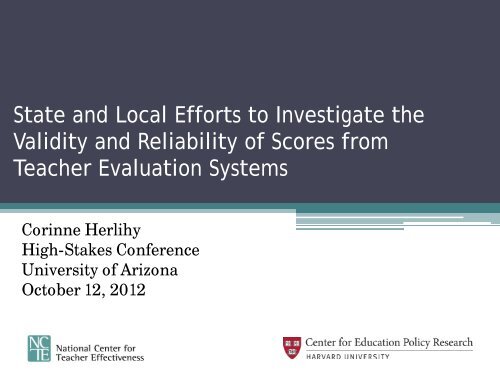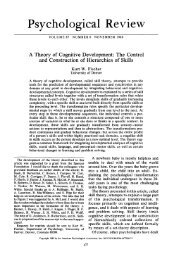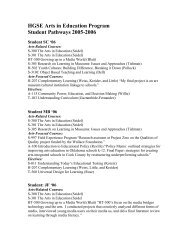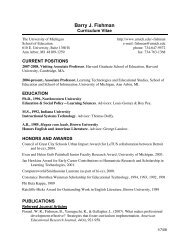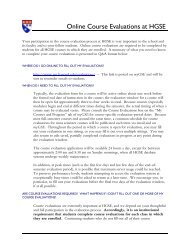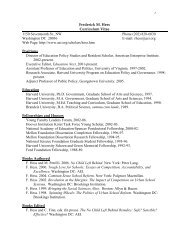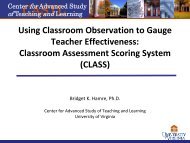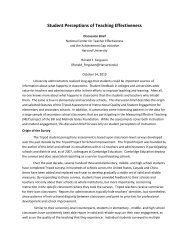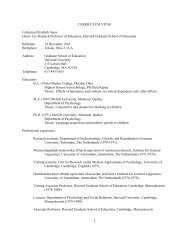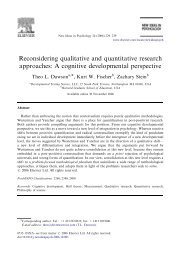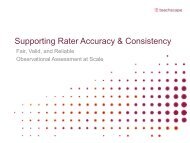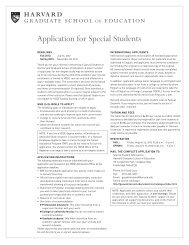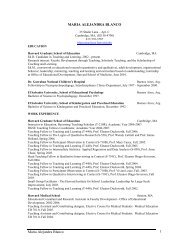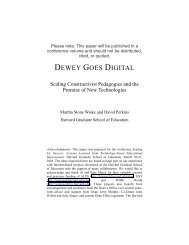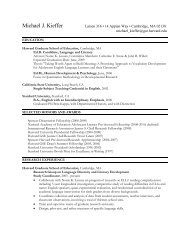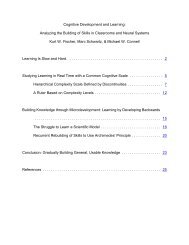Presentation slides - Harvard Graduate School of Education
Presentation slides - Harvard Graduate School of Education
Presentation slides - Harvard Graduate School of Education
Create successful ePaper yourself
Turn your PDF publications into a flip-book with our unique Google optimized e-Paper software.
State and Local Efforts to Investigate the<br />
Validity and Reliability <strong>of</strong> Scores from<br />
Teacher Evaluation Systems<br />
Corinne Herlihy<br />
High-Stakes Conference<br />
University <strong>of</strong> Arizona<br />
October 12, 2012
Overview<br />
• Introduction and purpose<br />
• Sample and Methods<br />
• What do we mean by valid and reliable?<br />
• Findings<br />
▫ Reliable and Valid<br />
▫ Evaluators, Instruments and Sampling Lessons<br />
▫ Decisions, PD for Teachers, and Changes in <strong>School</strong><br />
Culture
Purpose<br />
• We examine states’ efforts to investigate and<br />
ensure the reliability and validity <strong>of</strong> scores<br />
emerging from new teacher evaluation systems<br />
• We focus on areas known to be <strong>of</strong> concern in the<br />
production <strong>of</strong> high-quality observational scores<br />
▫ The choice <strong>of</strong> the observational instrument<br />
▫ Rater training and certification<br />
▫ The number <strong>of</strong> lessons collected per teacher per<br />
year
Sample <strong>of</strong> 17 States<br />
• Each state received a RTTT grant or NCLB<br />
waiver before July 1, 2012;<br />
• Conducted a pilot-test <strong>of</strong> its new teacher<br />
evaluation system during or before the 2012-13<br />
school year;<br />
• Had statutory language describing a teacher<br />
evaluation system which satisfied the<br />
requirements <strong>of</strong> RTTT or NCLB waiver;<br />
• And did not have any pending legislation, as <strong>of</strong><br />
7/1/12, which would substantially change the<br />
system
Methods<br />
• Document collection and analyses to answer<br />
basic questions about state-level guidance<br />
▫ Legislation and government guidelines,<br />
▫ RTTT applications, and<br />
▫ NCLB flexibility requests, etc.<br />
• Led to creation <strong>of</strong> a 25-question interview<br />
protocol<br />
• Interviews with 13 state DOE staff from 12<br />
states, typically a director, coordinator or<br />
executive <strong>of</strong>ficer <strong>of</strong> the state’s efforts to<br />
implement new teacher evaluation system
What do we mean by reliable and valid?<br />
What do states mean for scores to be reliable and valid?<br />
What efforts are underway to ensure the reliability and validity<br />
<strong>of</strong> scores?<br />
What would you like to see in order to assure reliable and valid<br />
scores?
What do we mean by reliable and<br />
valid?<br />
• Score validity<br />
▫ Construct validity<br />
• Face validity<br />
• Factor analyses or other construct identification<br />
procedures<br />
• Criterion-related validity<br />
▫ Consequential validity<br />
• Both for the individuals in the system<br />
• And for the system itself – are there positive or<br />
negative unintended consequences?
What do states mean for scores to<br />
be reliable and valid?<br />
• 9 states responded<br />
• The most common answer (3 states) was to see<br />
congruence between observation and studentassessment-based<br />
metrics<br />
• Two answers focused on elements <strong>of</strong> the system<br />
that would improve validity and reliability<br />
▫ a distribution <strong>of</strong> scores that better reflects reality<br />
▫ raters who are more grounded in benchmarks and<br />
evidence<br />
• Some answers were very vague, only loosely<br />
related to standards for validity and reliability
What efforts are underway to ensure the<br />
validity and reliability <strong>of</strong> the scores?<br />
• 12 states responded<br />
• Responses varied widely across states<br />
• Taken together states are attending to many <strong>of</strong><br />
the issues involved in establishing reliability and<br />
validity <strong>of</strong> assessment systems<br />
• Rare to see a state attending to more than a<br />
handful <strong>of</strong> issues at a time, and some states are<br />
attending to only one
What efforts are underway to ensure the<br />
validity and reliability <strong>of</strong> the scores?<br />
• Enhanced training <strong>of</strong> evaluators to meet<br />
standards<br />
• Empirical investigations (finished or planned)<br />
▫ Correlate VAM and observation scores<br />
▫ Investigate inter-rater reliability<br />
▫ Factor analyses <strong>of</strong> data<br />
▫ Studies <strong>of</strong> validity and reliability studies<br />
• Auditing/monitoring techniques planned<br />
• Selection <strong>of</strong> instruments with evidence <strong>of</strong><br />
reliability and validity
What would you like to see in order to<br />
assure reliable and valid scores?<br />
• 8 states responded<br />
• Responses widely varied across states, and, where we<br />
interviewed more than one <strong>of</strong>ficial per state, variable<br />
within states as well.<br />
• Two states were concerned with technical aspects <strong>of</strong> the<br />
production <strong>of</strong> VAM scores<br />
• Two states expressed concern about the reliability and<br />
validity <strong>of</strong> assessments in non-tested subjects<br />
• Two states suggested a process for improving reliability<br />
and validity<br />
• Other state concerns involved widening the pool <strong>of</strong><br />
evaluators
Who is required to conduct teacher observations?<br />
How did states go about choosing the instrument?<br />
How did states arrive at the number <strong>of</strong> required observations?<br />
Are there plans to report reliability and validity <strong>of</strong> scores?
Questions about the evaluators<br />
• Have you thought about how to account for<br />
possible subjectivity from raters? For example,<br />
principals/ coworkers assigning overly harsh or<br />
lenient scores?<br />
• Is your state/<strong>of</strong>fice involved in the training <strong>of</strong><br />
raters <strong>of</strong> classroom instruction? How?<br />
• Is your state/<strong>of</strong>fice involved in the certification<br />
<strong>of</strong> raters <strong>of</strong> instruction?<br />
• Is your state/<strong>of</strong>fice involved in the monitoring <strong>of</strong><br />
raters once they pass certification?<br />
• Do raters periodically have to recertify?
What we learned about evaluators<br />
• 17 states responded<br />
• Principals are primary and lone evaluators<br />
• All evaluators will participate in some type <strong>of</strong><br />
training<br />
• Training usually focuses on familiarizing raters<br />
with the evaluation process, rubrics and types <strong>of</strong><br />
evidence, although some training also includes<br />
how to provide effective feedback
Evaluators<br />
Who is required to conduct teacher observations?<br />
Principal/Administrator: (DE, FL, LA, MD, TN, NY, IL)<br />
Principal/Administrator OR instructional leader, other<br />
designee: (CO, IN, MA, OH, RI)<br />
Principal/Administrator and peer (NC)<br />
No specification (AZ, CT, GA, OK)<br />
Do states require multiple raters?<br />
Yes (NC)<br />
Recommend (IN)<br />
Conditional, only for an evaluation <strong>of</strong> ineffectual (MD)<br />
No (AZ, CO, CT, DE, FL, GA, IL, LA, MA, NY, OH, OK, RI,<br />
TN)
What we learned about evaluators<br />
• Rater training is both centralized and un-centralized,<br />
and in-house and by contract firms<br />
• Although some states talk about certification, very few<br />
describe an object evaluation process for raters<br />
• Many states will likely award certification for attending<br />
training sessions<br />
• Very few states specify a timeline for requiring rater<br />
recertification<br />
• Many states plan to provide ongoing pr<strong>of</strong>essional<br />
development and support to raters but this is rarely an<br />
objective monitoring process
Evaluators<br />
Who is responsible for training raters?<br />
State training (DE, GA, IL, MD, MA, OH, TN)<br />
District training (CO, CT, FL, IN, LA, NY)<br />
No specification or Other (AZ, NC, OK, RI)<br />
Do states require raters to meet objective<br />
certification criteria (other than simply attending<br />
a training workshop)?<br />
Yes (IL, LA, OH, TN, NC, OK)<br />
No (AZ, CO, DE, GA, CT, FL, IN, MA, MD, NY, RI)
Questions about observational<br />
instruments<br />
• How did you go about choosing the instrument?<br />
• What did you know about the tool before you<br />
adopted it?<br />
▫ Did you have any information about reliability <strong>of</strong><br />
validity?<br />
• What do you know about the way it has been<br />
adapted by districts?
What we learned about<br />
instruments<br />
• 11 states responded to question about how the<br />
instrument(s) was chosen<br />
▫ Most instruments were chosen by a committee or<br />
task force to align with state standards<br />
▫ Five states created their own tool; others uses an<br />
existing/modified tool(s)<br />
• 9 states responded to questions about how the<br />
instrument has been adapted by districts<br />
▫ Unless the state model was mandated, few states<br />
knew <strong>of</strong> district implementation plans
Type <strong>of</strong> Evaluation System<br />
Entirely state-based<br />
system (DE, GA)<br />
State model(s) with<br />
some district choice<br />
(IL, MD, MA, NC,<br />
OH, OK, RI, TN)<br />
Mainly district<br />
developed (AZ, CO,<br />
CT, FL, IN, LA, NY)
What we learned about<br />
instruments<br />
• 10 states responded<br />
• Most states reviewed some information about<br />
the validity and reliability <strong>of</strong> the instruments<br />
chosen<br />
▫ Two states did their own study<br />
▫ One state plans to do its own study<br />
▫ Three states looked at data provided by outside<br />
sources<br />
▫ Four states did not know about the reliability or<br />
validity <strong>of</strong> the instrument
Questions about sampling <strong>of</strong><br />
lessons<br />
• We know that statutes require X observations per<br />
teacher per year. Can you tell me a little about how you<br />
arrived at that number?<br />
• Was any kind <strong>of</strong> study conducted using your instrument<br />
in order to determine the optimal / most cost efficient<br />
number <strong>of</strong> observations? If so, when? If not, why not?<br />
• Is there any flexibility around this number? Off-thebooks<br />
guidance to districts around the number <strong>of</strong><br />
observations?<br />
• Have you determined if any <strong>of</strong> these observations will be<br />
unannounced? Why or why not?
What we learned about sampling<br />
<strong>of</strong> lessons<br />
• 10 states provided information about how the number <strong>of</strong><br />
observations was determined<br />
• None indicated that there was a formal study to<br />
determine the optimal number <strong>of</strong> observations<br />
• Four states mentioned using research from other studies<br />
(MET was mentioned three times) to determine the<br />
number<br />
• Five states indicated that the number was arrived at<br />
through a negotiation process with teachers' unions<br />
• Five <strong>of</strong> the states indicated that the number was chosen,<br />
at least in part for practical and logistical reasons<br />
• Two states said that raters are encouraged to conduct<br />
more observations if needed
States by<br />
Number <strong>of</strong> Observations Required<br />
10<br />
9<br />
8<br />
7<br />
6<br />
5<br />
4<br />
3<br />
2<br />
1<br />
0<br />
0 (OK) 1 (FL, DE) 2 (AZ, CO, GA,<br />
IL, IN, LA,<br />
MD, NY, OH)<br />
3 (CT, MA, NC,<br />
RI)<br />
4 (TN)
Are there plans to report the<br />
reliability and validity <strong>of</strong> scores?<br />
• 11 states responded<br />
• Few states have plans to publish reliabilities,<br />
though many states plan to conduct research on<br />
the new systems<br />
• Only 3 states (<strong>of</strong> 17 in full sample) have<br />
legislation that requires a report on aspects <strong>of</strong><br />
reliability and validity
State specifies inquiry into overall scores<br />
CT, IL,<br />
NC, OK,<br />
TN<br />
CO,<br />
GA,<br />
MA,<br />
NY,<br />
TN<br />
LA, OH<br />
Inquiry into value added scores<br />
Inquiry into observation system
What purposes will the overall teacher evaluation scores be<br />
put?<br />
Are there efforts to ensure those decisions are correctly made?<br />
What kinds <strong>of</strong> PD are teachers receiving about the new<br />
systems?<br />
Do you think the evaluation system may change the culture in<br />
schools?
What purposes will the overall<br />
teacher evaluation scores be put?<br />
• 17 states responded<br />
• All but one state (AZ) specify consequences <strong>of</strong><br />
poor performance on a teacher evaluation,<br />
ranging from not receiving raises, participating<br />
in assistance programs and remediation plans to<br />
dismissal and termination.<br />
• All but one state (CT) specify some consequence<br />
for excellent performance, ranging from<br />
bonuses, salary increases, non-probationary<br />
status, tenure, and fewer observations in the<br />
future.
Are there efforts to ensure those<br />
decisions are correctly made?<br />
• Only 3 states responded<br />
▫ Few states have specified ways to ensure correct decision making.<br />
• Most states say they are waiting to see how the new<br />
system works and may make adjustments<br />
• “Yes, again, that’s work over time. That’s part <strong>of</strong> –back to those<br />
validity arguments that we’re going to be making. So right now<br />
our big check is are we correctly identifying effective teachers. And<br />
has someone been misidentified? And so there are procedural<br />
safeguards in place for that. And we’ll be following the data over<br />
time. But we haven’t—last year was a gradual implementation <strong>of</strong><br />
the model. We’re about to launch the first full year <strong>of</strong> evaluations,<br />
so we’ll be doing that work.”
What kinds <strong>of</strong> PD are teachers<br />
receiving about the new systems?<br />
• 12 states responded<br />
• 10 indicated that pr<strong>of</strong>essional development and<br />
information for teachers was largely left to<br />
districts<br />
• One state had been directly involved in<br />
informing teachers by delivering presentations<br />
and talks to different schools<br />
• One state that had recently passed legislation<br />
charging the state to provide training on the<br />
evaluation system to all teachers
What kinds <strong>of</strong> PD are teachers<br />
receiving about the new systems?<br />
• There were four states that were using variations<br />
<strong>of</strong> "train the trainer" models<br />
• Two states described providing building level<br />
principals "meetings in a box" to disseminate<br />
information about the evaluation systems.<br />
• Four states mentioned that they were providing<br />
information about the evaluation and training<br />
opportunities through online platforms.<br />
Webinars were mentioned by <strong>of</strong>ficials from two<br />
states.
Do you think the evaluation system<br />
may change the culture in schools?<br />
• 7 states responded<br />
• All respondents acknowledged to some degree that the<br />
new evaluation systems would identify fewer teachers in<br />
the top tier than the previous system did<br />
• Four <strong>of</strong> the states specifically mention that the transition<br />
will be difficult<br />
• Four states talk about the difficulties in redefining the<br />
ratings <strong>of</strong> "satisfactory" and "pr<strong>of</strong>icient" so that the<br />
expectation isn't that all teachers should pile up at<br />
"exemplary“ category
Do you think the evaluation system<br />
may change the culture in schools?<br />
• In one state, there are plans for principals themselves to<br />
be evaluated on their ability to be good evaluators, which<br />
may, the <strong>of</strong>ficial said, help to temper any perverse<br />
incentives principals could have to assign inflated scores<br />
• Finally, one state framed the shift to identifying fewer<br />
exemplary teachers as quite positive, saying,<br />
▫ "It’s going to come down to embracing the principles<br />
behind the model and being able to communicate and<br />
message that throughout schools and districts while really<br />
fostering a sense <strong>of</strong> trust, that this is not about - it’s not a<br />
gotcha, but this is about identifying, recognizing truly<br />
excellent practice, …seeing this as a collective effort to get<br />
better... knowledge is power."
Conclusions<br />
• An important goal for research and policy-makers is to<br />
investigate whether the right decisions are made based<br />
on evaluation scores<br />
• Few seem to be considering the negative unintended<br />
consequences <strong>of</strong> a system that may generally be<br />
perceived <strong>of</strong> as being arbitrary<br />
• There has been huge change in a very short time, and<br />
there may be good reasons why states are falling short in<br />
the effort to balance better systems and available<br />
resources—but, states are not necessarily making<br />
informed trade-<strong>of</strong>fs<br />
• While most states seem to understand that<br />
implementation is key, they may not understand its<br />
implications for validity and reliability
If you have questions or would like more<br />
information, please contact:<br />
Corinne Herlihy<br />
Project Director<br />
National Center for Teacher Effectiveness<br />
<strong>Harvard</strong> <strong>Graduate</strong> <strong>School</strong> <strong>of</strong> <strong>Education</strong><br />
50 Church Street, 4th Floor<br />
Cambridge, MA 02138<br />
617-496-9817<br />
corinne_herlihy@gse.harvard.edu


